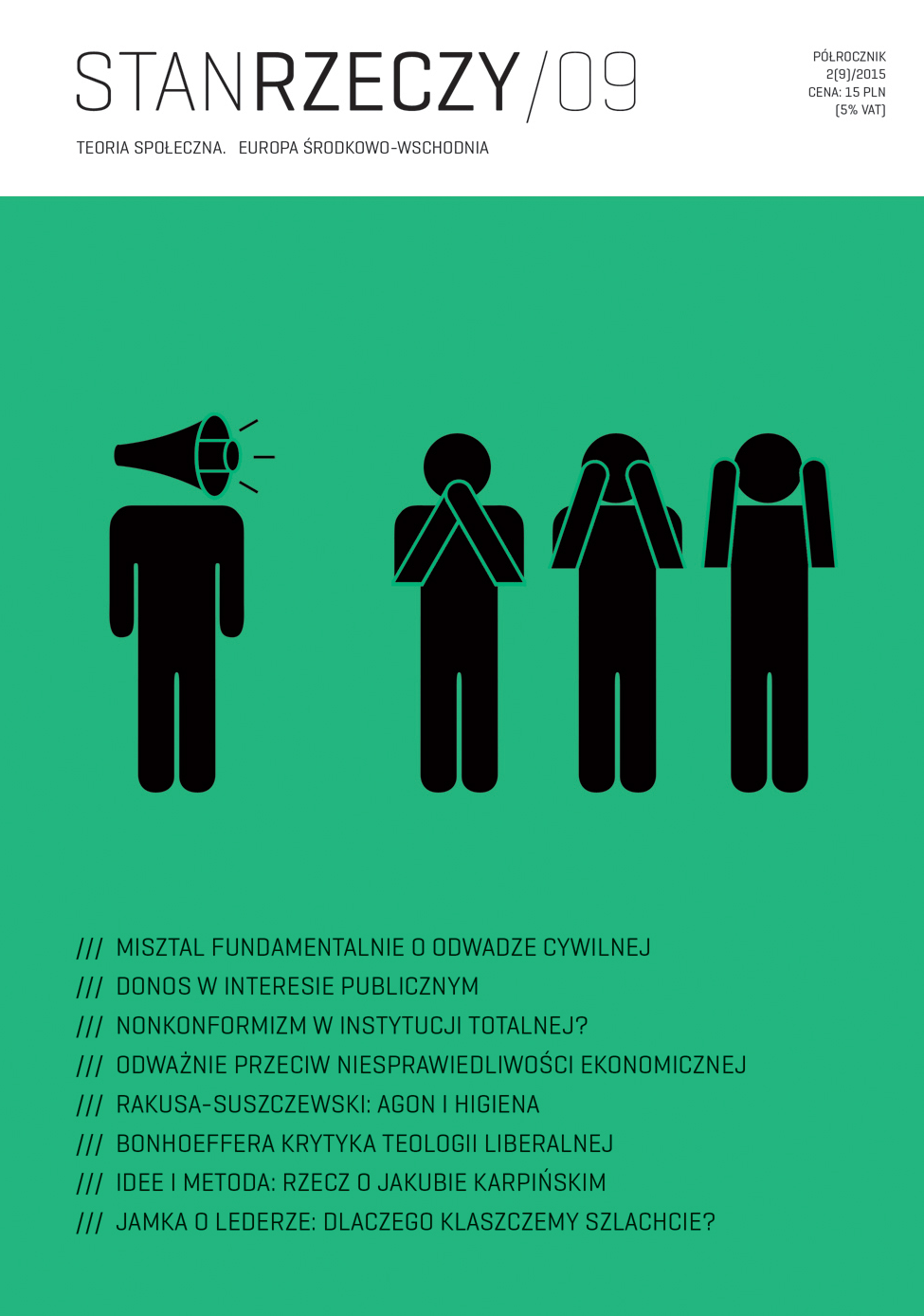
We kindly inform you that, as long as the subject affiliation of our 300.000+ articles is in progress, you might get unsufficient or no results on your third level or second level search. In this case, please broaden your search criteria.



Celem artykułu jest ocena socjologii Jakuba Karpińskiego, a w szczególności – jego teorii komunizmu. Opierając się na teorii Rene Girarda, która na przykładzie pisarzy wyjaśnia „powieściowe nawrócenie”, artykuł opisuje „nawrócenie socjologiczne” polskiego socjologa. To socjologiczne nawrócenie polegało na pozbyciu się iluzji autonomicznego podmiotu i odkryciu własnej zależności od czegoś, co przekracza jednostkę i czemu można dać świadectwo. Już na samym początku swojej drogi akademickiej Karpiński wybrał służbę swojej wspólnocie narodowej i naukowej, a całe jego pisarstwo jest opisem tego, w imię czego i przeciw czemu walczył. Wynikiem pracy polskiego socjologa jest integralna teoria komunizmu, która wartościuje i wszechstronnie opisuje miniony system, a zarazem wskazuje dwie drogi wyjścia z niego: prawdę i solidarność.The goal of the paper is to describe Jakub Karpiński’s sociology and specifically - his theory of Communism. It extends the Girardian concept of „novelistic conversion” to show that sociologists, just as novelists, undergo conversion that makes them realize that they are dependent on something they can give witness to. Already in the beginning of his academic career, Karpiński decided to serve his scholar and national community. His further work articulated what he fought against and what he fought for. In consequence, he constructed an integral theory of Communism, which validates, describes the bygone system as well as points to ways of overcoming it: truth and solidarity.
More...

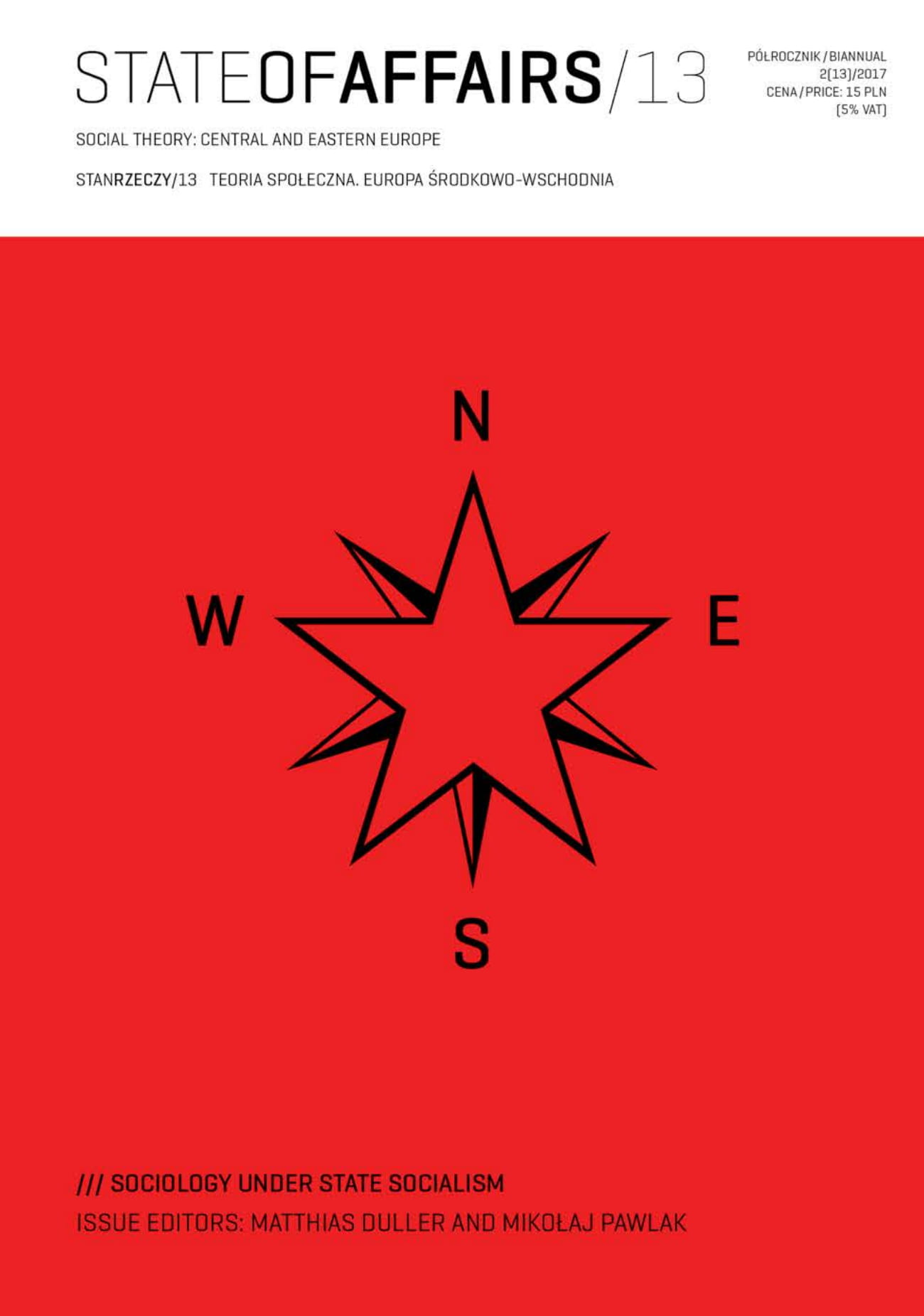
In our article we will present two Eastern European examples of how sociological research on everyday life in the 1970s has been influenced by political and cultural circumstances and particular scientific traditions. From the early 1970s, sociology flourished in some countries of the Eastern Bloc, institutes were refounded, and research projects were heavily subsidised. Research into daily life – the so-called “socialist lifestyle” – was one of the main foci of sociological inquiry. Recently, similar data collections from two such projects were discovered in the archives of academies of sciences in Hungary (HAS) and Poland (PAS). In both cases, we can see that the researchers stand decisively on the side of “high” culture, while taking a normative view of “low”cultural consumption. Even though there was no direct cooperation or interdependence between Hungarian and Polish “lifestyle” researchers, we can observe similar structures of thinking about socialist society. Western influence, mostly implicitly, is also visible.
More...
This paper focuses on official Marxist sociology and social science research in Czechoslovakia as one of the central “disciplines of governance” in the 1970s and 1980s. With most of the first-class practitioners being purged after 1968, the study pays little attention to the intrinsic value of sociological production in the given period, but focuses instead on the modus operandi of “apologetic sociology”: the ways in which sociological knowledge was used to help manage “socialist society” under the late-communist regime, and how that knowledge was adapted to the changes brought about by perestroika (while anticipating the discipline’s own transformation during the early liberal democratic period after 1989). First, the paper deals with the reformulation, during the early 1970s, of Radovan Richta’s theory of scientific and technological revolution from the originally reform-communist, emancipatory, and technology-optimistic concept of the 1960s into a hegemonic legitimation paradigm allied with the closely related social management theory elaborated by František Kutta. Then the paper addresses the more practical side of the paradigm, as exemplified by Jaroslav Kohout’s economic sociology and his theory of labour collectives as central sites of state socialist socialisation and the disciplining of citizens. Finally,the paper considers semi-official research endeavours and expert “niches” during the 1980s, and how they drew legitimacy and state financial support from the claim that they were contributing to the “social-scientific steering of society” – while they stayed away from direct ideological engagement. It is these “niches” that formed the new sociological mainstream in the early liberal democratic period after 1989. That mainstream gave legitimacy not only to post-dissident social concepts such as “civil society” but also to the managerial and governance techniques of the emerging neoliberal capitalism. The paper exemplifies this branch of research by the mainly Bratislava-based group revolving around Fedor Gál and Pavol Frič and their development of a nonconformist method of “problem-oriented participative forecasting” during this period.
More...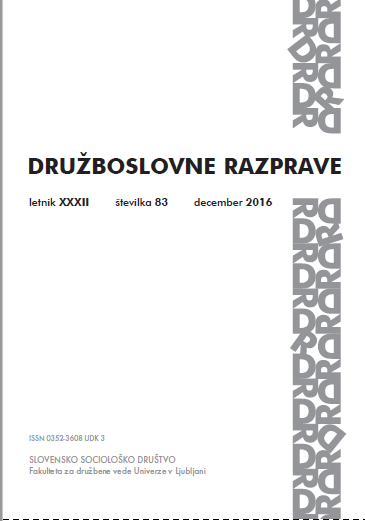
Sociology’s possible roles of producing knowledge and shaping society can suggest several different approaches to teaching. In our article, we conduct a macro-level review of sociology’s role in society. We touch upon the issue of value-free sociology (stressing scientific neutrality) and then refer to Burawoy’s programme of public sociology (advocating involvement in civil society) and its criticism. We connect this with the Hungarian experience which shows that while sociology was historically involved, to various extents, in shaping society by either legitimating or challenging the status quo, nowadays this function seems to be superfluous for the architects of political power. In such a social context, even the goals of improving students’ reflexivity and critical thinking might be seen as a political act.
More...
Reading A Sociology of Modernity made me turn again towards history and encounter the path of a historical sociology. One can say that Peter Wagner´s work opens up particularly rich perspectives towards a new consideration of the complex relations between sociology and history and on the consequences that the internal movements within each discipline have had on the other. I shall approach some issues regarding these relations by looking, first, at the theme of temporality and at the distinction between the past and a present (often turned towards the horizon of the future) and, second, at the theme of the events and their frequent contradistinction to structures.
More...
In his recent work Peter Wagner has dealt with understandings of modernity in different world regions. He has expanded the analysis of modern transformations in Europe to parts of the Southern world. This turn in his work has been a response to challenges about the development of Western modernity, including his own earlier arguments. This article explores some features of Wagner’s recent research on the Brazilian, European and South African trajectories of modernity and his proposal for a world-sociology. The aspects of his work that I am especially interested in are: i) the establishment of the Atlantic connection for the ‘enablement’ of the modern transformation in the nineteenth century; ii) the question about the spaces where experiences happen and the interpretation of temporal transformations and historical continuities. As a sociologist who takes a classical approach to the analysis of historical transformations, Wagner has developed a conception of trajectories of modernity using the notion of societal self-understanding to challenge both conceptually and empirically the presuppositions of communality and continuity assumed as guiding ideas to account for difference in the modern world. I explore in this article the advantages of Wagner’s unorthodox sociological perspective that is to propose both a general understanding of autonomy as key features to comprehend historical transformation and to show how reflexivity opens up a variety of ways of being in the world.
More...
Prikaz/Review: Branko Balj, Neoliberalizam - redukovana praktična filozofija, „Beograd“, Zrenjanin, 2013.
More...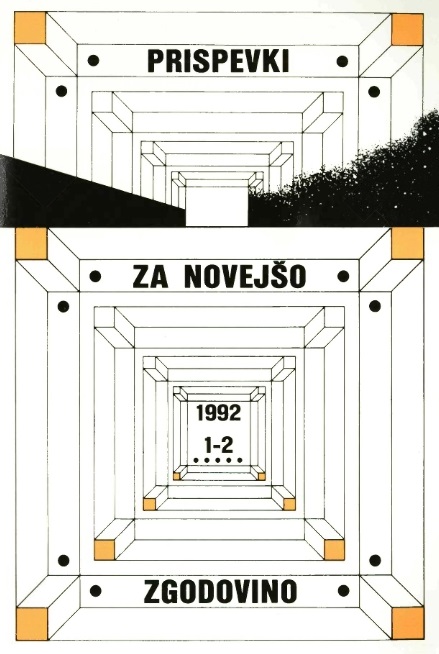
The review of: Franc Rozman: Korespondenca Albina Prepeluha. - Abditusa. Arhivsko društvo Slovenije, Ljubljana 1991, 86 strani (Viri ; 4)
More...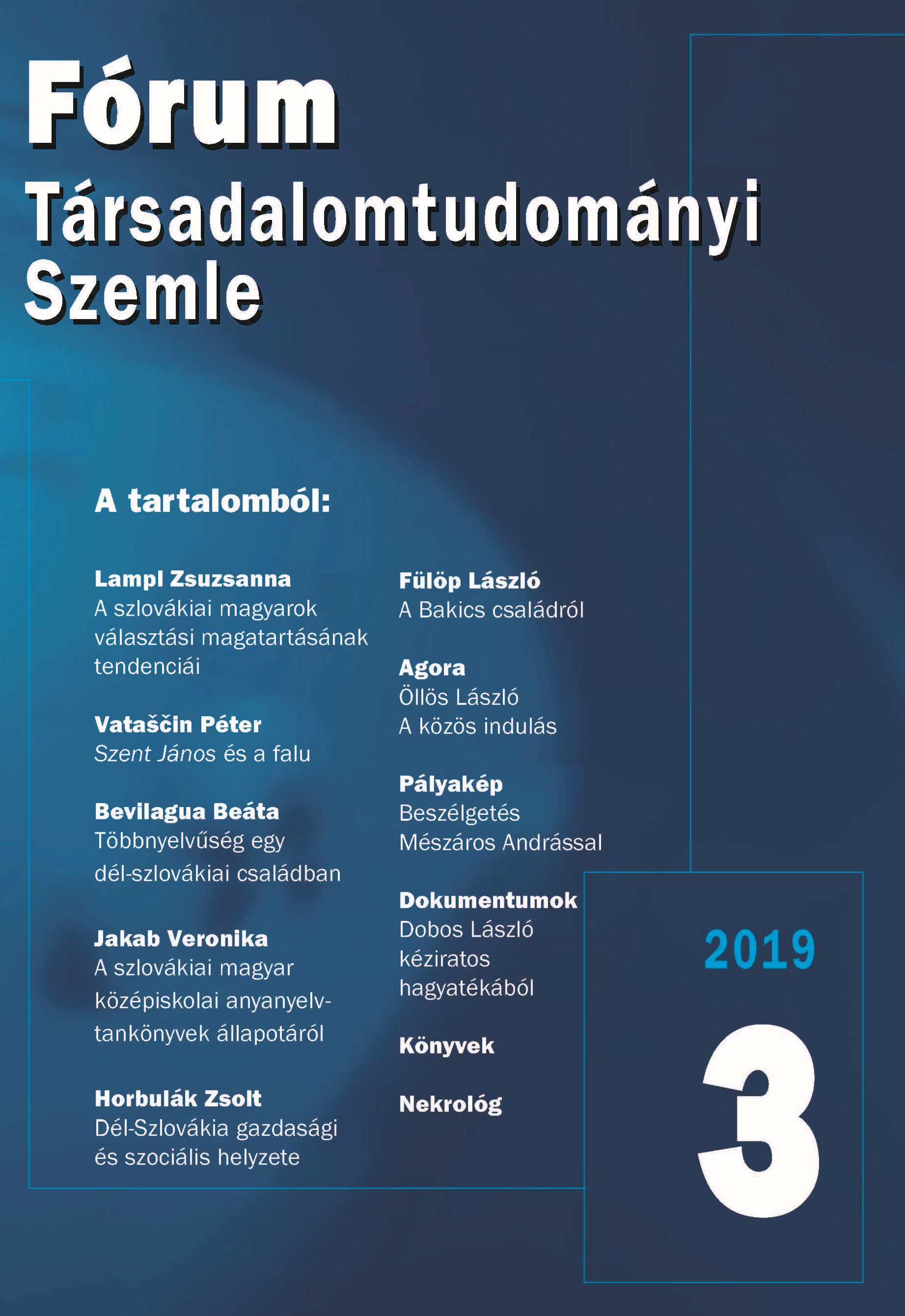
Maurice Halbwachs: Az emlékezet társadalmi keretei, ford. Sujtó László. Budapest, Atlantisz, 2018, 375 p.
More...
Kina, i sve što se u njoj i oko nje događa, izaziva interesomvanje u Zapadnom svetu. Sve što je u vezi sa ovim tako dalekim i čini nam se uvek nepoznatim svetom, kultura, običaji, način života, istorijska prošlost, predstavlja neiscrpni izvor radoznalosti mnogobrojnih istraživača društva.
More...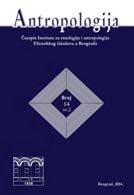
The understanding of the relation between the man, society and war is expressed in the sets of historically changeable relations, where the theories and doctrines of war tell us a lot not only about the art of warfare and the ways wars were waged throughout history - as it may seem at first, bearing in mind their focus on the matters of strategy, tactics, logistics, armed formations, manoeuvres, sieges, soldier drill, etc - but they also provide us with information on general understanding of man, the level of organization of society, and of the regimes of knowledge and the new "models of truth", characteristic of certain age. The choice to discuss the relation between Klausewitz’s and Faucault’s understanding of war in this paper is determined by the anthropocentric twist which occurs in the theory and practice of war in late 18 and early 19 century. It is in this period that modern theory of war is established, by introducing human factor and manpower as the backbone of warfare instead of earlier siege wars around fortifications. The main theoretical representative of the new approach is Klausewitz. He gives central importance and the key role to man in defining the outcome and the goals of war, and modern war is defined as a clash of manpower also in the political sense, as an expression of general will in the society. Historically, this is the period of establishment of modern states, of the sovereignty of the people, and the period when conscription was introduced. On the other hand, and in contrast to this approach, according to Foucault this is the period of establishment of modern anthropocentric episteme and of introduction of mechanisms of total bio-political surveillance in the management and control mechanisms of the state, the most exemplary manifestation of which is found in military institutions and techniques of military training and warfare. According to Foucault, the state takes over the monopoly of warfare and defines war in a total sense, as total war for existence, as the war of a nation for its survival, a necessity, as both regularity and irregularity of the state order, thus pushing it to the margin of its legitimacy as a lasting, hidden subtext, but also as a generator and driving force of the dynamics of society and as a cornerstone of modern, popular sovereignty. The idea of popular sovereignty represents the ideological framework for modern instrumentalization of citizens for warfare. These two approaches represent diametrically opposed starting points regarding the relation between sovereignty, authority and war and the understanding of the importance and role of man in the wars of modern states.
More...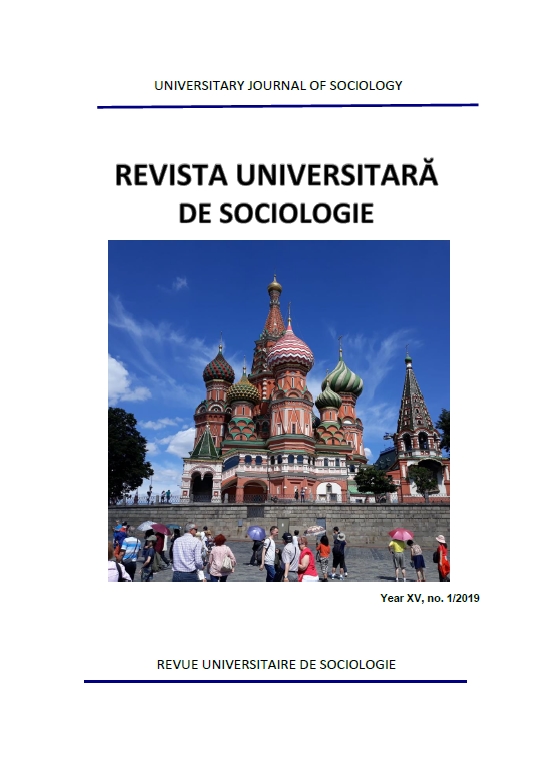
What if considering culture, the fifth theater of strategic operations? - the fourth being the cyberspace, alongside with air, ground and sea traditional theatres of operations. The fifth theatre of operations is, more precisely, about controlling/defending/targeting the cultural space of a society, the DEFSPACE. This is the realm of the Geopolitics of Representations, the distribution of culturally vectorized power over a certain geography. Some of the invoked theories are Lacoste/Gourdin’ Geopolitics of Representations, Goffman’s stigma, Buzan’s societal security, Putnam’s social capital. In the end Anton Golopenția’s revolutionary theory of state cohesion will be briefly resurfaced. The short schema of ”defining is ruling” is the following: any state is glued around to a certain idea – the “idea of state” where its culturally defined DNA of legitimacy is stored. This glue effect is manifesting itself through the processes of bonding and bridging, the stronger they are, a stronger social capital a country has. The stronger the social cohesion (social capital) the better it is the national security status. One of the main inhibitors of bridging and bonding is stigmatizing, the process of debasing the collective self-esteem by manipulating certain definitions at the macro-cultural level, in particular. Anton Golopenția’s approach towards building the idea of state at the spiritual level is of particular interest, since he writes down in very close detail the main axis of representing the idea of state.
More...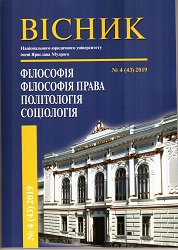
Problem setting. Humanity entered the era of globalization, which is characterized by a number of factors - national economies have melded into a single global system where the capital can easily move, new information opportunities have made the world more open, the technological revolution has led to a qualitative change in the means of production and consumption, the planetary scientific revolution has become a reality; developed industrial countries are striving to liberalization of the movement of goods and capital, the world is moving closer together on the basis of modern means of communication; new international social movements, new modes of transport, new telecommunication technologies are being implemented, education is being internationalized. However, all these innovations have not made the issue of war less burning. World society has faced the trend of increasing wars and armed conflicts in the world over the past decades and in the total number of killed and injured have grown as a result of hostilities.Recent research and publications analysis. Numerous works written on the target topic indicate that the issues of war as a specific phenomenon in the life of human society have always been and remain in the focus of attention of thinkers, scientists, researchers of the past and the present time. In particular, the thorough analysis of the essence, content, forms of war, its features and laws have been carried out in the works written by V. F. Hegel, F. Engels, C. von Clausewitz, B. Liddel-Hart, N. Machiavelli, V. Mandragel, H. von Moltke, C. Moscos, J. Friedman, F. Fukuyama, S. Huntington, R. Aron, K. Hajiyev, M. Gareev, V. Slipchenko, V. Smolyanyuk, E. Toffler, M. Trebin, I. Panarin, V. Serebryannikov and so on.Paper objective. The goal of this paper is to specify the historical background of the formation of modern sociology of war.Paper main body. The article deals with the views on the war in a historical perspective, focuses on the methodological grounds of the armed confrontation, which started after the Second World War when the most developed countries developed a powerful military-industrial complex dominating in politics and economics. Potential opponents sought to overtake each other, to shift the developed military-strategic parity pursuing own benefit. They begin to develop nuclear missile weapons, which radically changed the concept of war over a short time. Due to the increase in the power of nuclear weapons, the leading authorities in the world military sphere and subsequently the military-political leaders of the countries-members of the nuclear club gradually started to understand that one of the long-term tasks is to contain the use of nuclear weapons by the enemy.The article emphasizes that the late 1950s - early 1960s are characterized by a significant increase in attention to the theoretical problems of war and peace. This is due to the creation of the military-political blocs of NATO and the Warsaw Pact. Since then many publications have appeared which focus the primacy of politics over the military sphere. Military theorists understand that the outbreak of war to solve political goals could lead to irreversible consequences. At the end of the 20th century with the beginning of globalization, many concepts arose to search for the causes of wars. The confrontation of the West with the rest of the world in the face of growing multi-polarity can become a cause of war and conflict at the beginning of the third millennium.The article also highlights the concept of mutiny war, which is seen as a new form of armed conflict, in which the future wars would be waged by small terrorist cells and special forces, gaining influence by subversion and organized revolutions rather than through traditional warfare.Conclusions of the research. Numerous theoretical and practical issues related to determining the laws of war, its essence and features as well as to transforming the goals, scope, nature and means of armed struggle and the importance of the human factor for the consequences of hostilities for a particular country and humanity as a whole should be considered on the basis of recognizing the fact that the phenomenon of war is eternal, inevitable and unavoidable. The views and concepts that were formed in the second half of the 20th century have not rejected and condemned armed violence but also approved and legitimized it, adapted to the needs of foreign policy and even have rationalized it. Political and military leaders have sought to make people consider the war in all its forms and violence as a common phenomenon that states and people can tolerate in their relations. The probability of using armed violence in the system of the modern world order can easily become a reality.
More...
Problem setting. Rethinking inequality in the space of globalization processes creates a field of theoretical discussion and empirical researches regarding the criteria for the formation of class dispositions. As experience shows, globalization erases the usual differences between classes and classical instruments for measuring the middle class exclusively by economic and professional criteria (as it was convenient to do in the industrial wave) are no longer suitable, since in the information society the class differentiation of groups is no longer based on symbols of affected consumption, but it often has ideological symbols.Paper objective. This article is devoted to the evolution of sociological views on the problem of social inequality in order to define new criteria for class differentiation and their symbolic meanings.Paper main body. One of the key aspects of the post-social cultural and ideological transformations is the sense of the category of “riches”. The number of categories has become greater and more significant, and economic and political restructuring of the remaining 30 years. The mean value of the category of “reaches” associated with difficult experiences characterized by cultural and social transformations. Today, the middle and upper classes no longer differ in their behavior in the field of consumption.However, class symbols are dynamic, some disappear and some increase. There are three types of career symbols of class status that Е. Goffman recalls in earlier articles. First of all, they can weaken with the group that relies on them. When a former ruling class, which once held privileged economic positions, loses them, it has to declare its dominance, create cultural symbols.The second difficulty with the characters - they are approved by the group. At some point, artists who created content for the aristocracy, begin to despise the bourgeois, and then the bourgeois begin to take pride in friendship with the bohemian and adopt her demeanor. The sociologist Pierre Bourdieu studied the formation of an aesthetic taste for the works of culture. On the large empirical material, Bourdieu showed that aesthetics does not obey any objective set of laws, but conforms to status hierarchies, though not reduced to them.Conclusions of the research. Thus, the social structure of developed societies gradually goes into the shadows, disguising their symbols for indiscriminate consumption. What becomes status is no longer relevant to material things: these are symbols of a certain worldview, an image of an unsightly healthy lifestyle, far from the eyes of Google’s navigation and trendy serial currents. This opens up a new field of debate for social structure researchers regarding methods and tools of measurement.
More...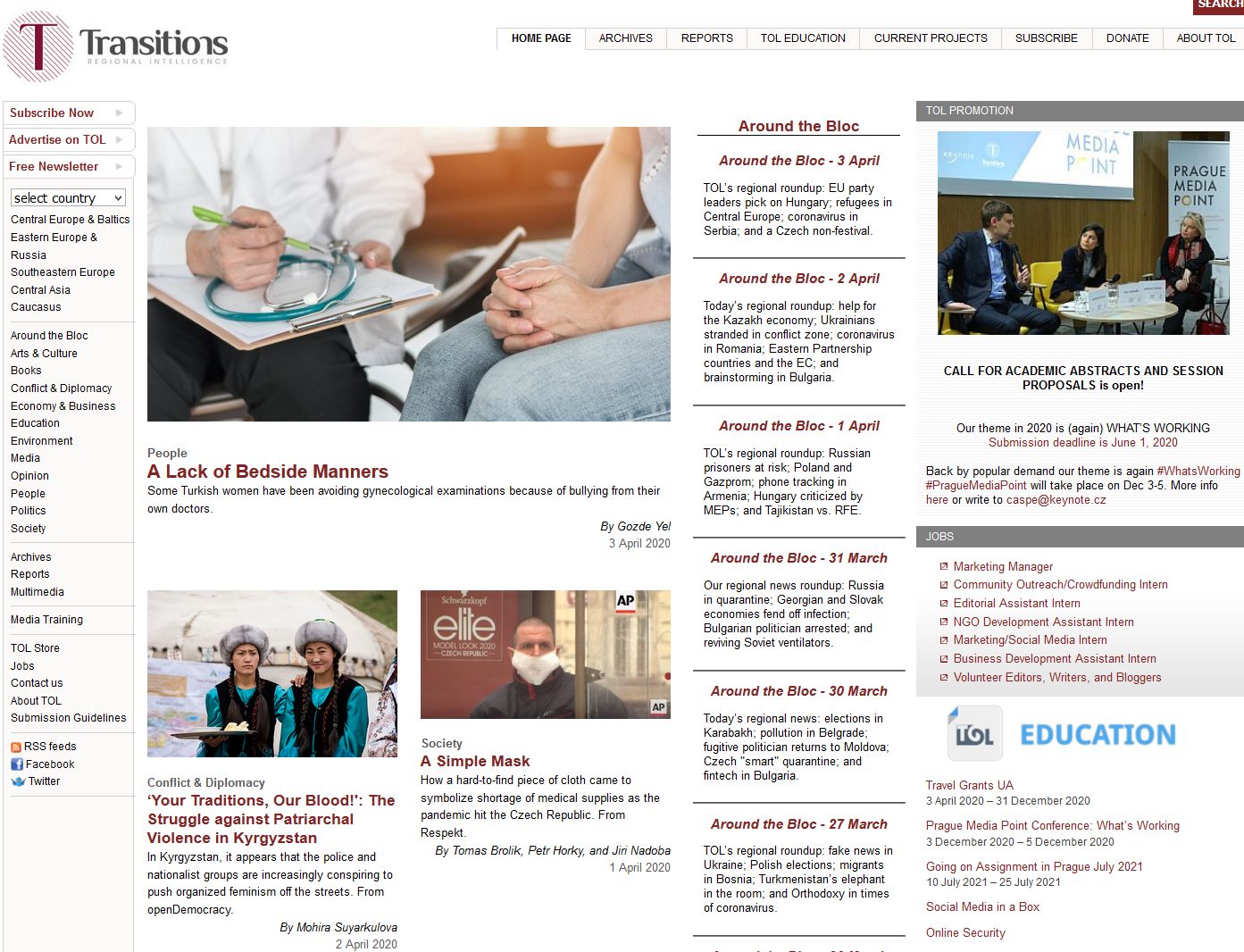
With domestic violence rates in Belarus among the highest in Europe and few legal protections, some women are turning to self-defense classes.
More...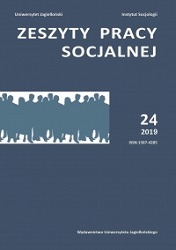
The present article discusses the influence on the development of applied sciences exerted by Rudolf Virchow (1821–1902) – a German physician, pathologist, anthropologist and political activist, who is considered the father of Public Health and Social Medicine. His research on medical aspects of poverty lead him to conclusion that radical solutions are needed in providing medical care, but also in education and public policies. The main stress is put on the social dimension of Virchow’s thinking and its impact on practice.
More...